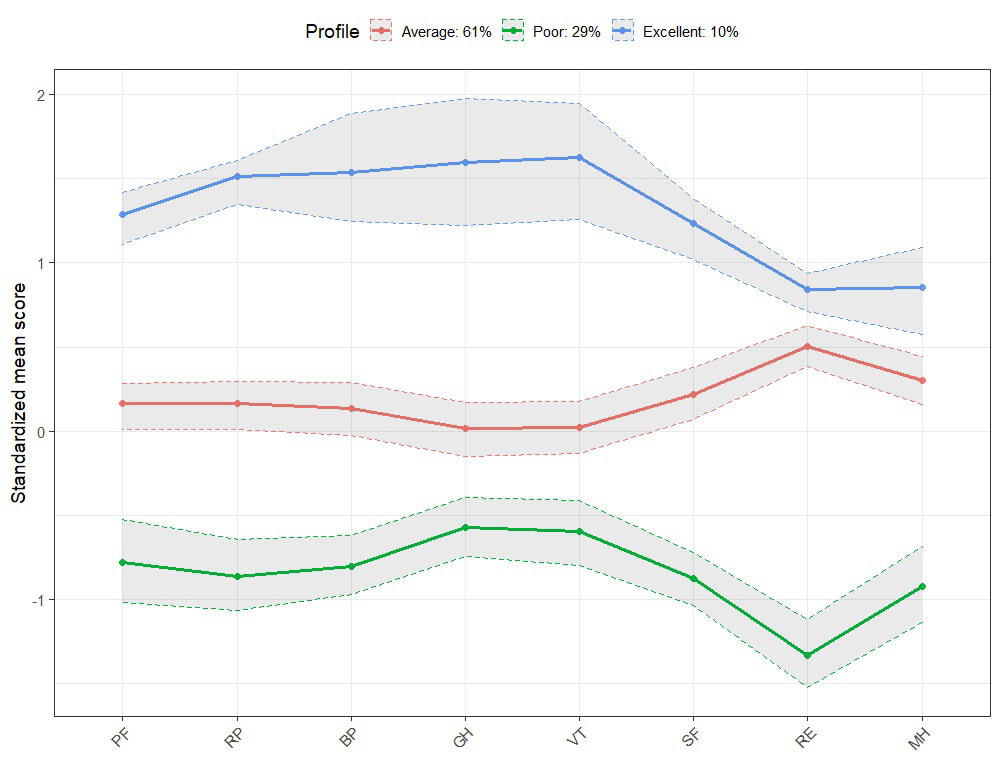Session Information
Date: Monday, November 14, 2022
Title: SLE – Diagnosis, Manifestations, and Outcomes Poster III: Outcomes
Session Type: Poster Session D
Session Time: 1:00PM-3:00PM
Background/Purpose: Poor health-related quality of life (HR-QoL) is well recognised within patients with connective tissue diseases (CTD). We hypothesised that subgroups of patients across the spectrum of CTD experience different HR-QoL patterns, and aimed to determine patient-level characteristics associated with different subgroups.
Methods: The Medical Outcomes Study Short-Form 36 (SF-36) questionnaire was used, and the eight continuous domains of the SF-36 questionnaire were derived which range from 0 to 100, with higher scores reflecting better HR-QoL. We used the “mclust 5.4.9” model-based clustering package in R V4.0.4 to identify latent profiles (LP) of patients with distinct HR-QoL patterns. Variances were equated and covariances fixed to zero. Missing values were imputed using methodology suggested by the SF-36 manual. Multivariable ordinal logistic regression was used to determine patient-level characteristics associated with each HR-QoL subgroup identified. Models were adjusted for ethnicity, sicca symptoms, fibromyalgia, anti-dsDNA antibodies and co-morbidities (using Charlson comorbidity index).
Results: Three-hundred and nine patients within the spectrum of CTDs completed the SF-36 questionnaire, (280 [90.6%] women, mean [SD] age 48.9 [12.9] years). There were 115 (37.2%) patients with lupus, 72 (23.3%) undifferentiated CTD, 56 (18.1%) primary Sjögren’s syndrome and 66 (21.4%) systemic sclerosis, myositis or an overlap syndrome (SSc-IIM). Three latent profiles were identified with poor (n=89; 28.8%), average (n=190; 61.5%) and excellent (n=30; 9.7%) HR-QoL (figure1). In multivariable models (table 1), LP were not associated with diagnostic grouping (Sjögren’s: OR 1.16 [95% CI 0.54-2.48]; undifferentiated CTD: OR 1.22 [95% CI 0.65-2.29]; SSc-IIM: OR 1.23 [95% CI 0.62-2.44]). There was no association with autoantibody profiles. Black ethnicity (OR 0.22 [95% CI 0.08-0.63]), Asian ethnicity (OR 0.39 [95% CI 0.19-0.78]), concomitant fibromyalgia (OR 0.40 [95% CI 0.21-0.78]), sicca symptoms (OR 0.57 [95% CI 0.35-0.92]) and multi-morbidity (OR 0.81 [95% CI 0.67-0.97]) were associated with the ‘poor’ HR-QoL LP.
Conclusion: Poor HR-QOL is common in patients with CTDs and patients can be clustered into distinct HR-QoL subgroups that is not primarily driven by their specific diagnosis or autoantibody profile. We identified a number of key demographic and clinical factors associated with poor HR-QOL in this population. These factors need to be addressed across the whole CTD spectrum as part of a holistic management approach aimed at improving overall patient outcomes.
To cite this abstract in AMA style:
Dyball S, Reynolds J, Chinoy H, Herrick A, Haque S, Bruce E, Naz S, Parker B, Bruce I. Health-Related Quality of Life Across the Spectrum of Connective Tissue Diseases: A Latent Profile Analysis [abstract]. Arthritis Rheumatol. 2022; 74 (suppl 9). https://acrabstracts.org/abstract/health-related-quality-of-life-across-the-spectrum-of-connective-tissue-diseases-a-latent-profile-analysis/. Accessed .« Back to ACR Convergence 2022
ACR Meeting Abstracts - https://acrabstracts.org/abstract/health-related-quality-of-life-across-the-spectrum-of-connective-tissue-diseases-a-latent-profile-analysis/


